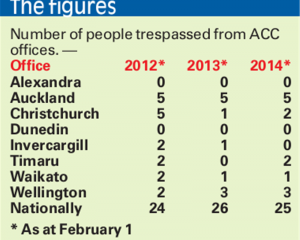Many Otago ACC claimants whose compensation payments have been reinstated will be eligible to receive interest payments which could total several million dollars overall, Dunedin lawyer Peter Sara believes.
ACC has already begun contacting clients who might benefit from a recent Court of Appeal decision that ''clarified circumstances'' in which interest should be paid on backdated weekly compensation.
Mr Sara believes potentially ''thousands'' of ACC claimants in Otago whose weekly compensation payments were suspended but later reinstated at any stage since 1992 could be eligible for the interest payments.
The overall payout could ''easily be multimillions''.
Some reinstated claimants had already received the interest payments, but these had previously been dealt with by ACC in a somewhat ''haphazard'' and ''piecemeal'' way, and many claimants had not been paid, he said.
ACC was required by law to make weekly compensation payments to injured claimants within a month of having gained all the relevant payment information, including medical data.
If the corporation then failed to make the payments ''the meter starts to run'' and interest was payable.
There was nothing novel, in strictly legal terms, in the recent court judgement, which confirmed the requirement to pay interest, which had been part of ACC's governing legislation since 1992, he said.
But the judgement was significant in that ACC was now appeared to be adopting a less restricted approach to interest payments.
He praised ACC's change of approach, which was''a step in the right direction''.
''Let's give a bouquet where it's due,'' he added.
ACC officials said the situation arose in some cases where payments had been suspended but later reinstated from the date of suspension.
Interest was not automatically payable on backdated weekly compensation and several factors had to be considered, including the date on which ACC received all necessary medical and financial information required to make a backdated payment, officials said.
Dunedin ACC campaigner Dr Denise Powell said the changed approach to interest payments would have ''massive implications'' for Otago ACC claimants, both in terms of the many people involved and the long time period.
Dr Powell also praised ACC for its ''positive proactive step'' in publicising its new approach to the interest issue.
ACC's actions were helping to rebuild some of the public's trust and confidence in ACC which had been lost in recent years, she said.
Mr Sara is a member of a recently-established Advocates and Representatives Group (ARG), which provides strategic and policy advice to ACC.
Dr Powell is president of Acclaim Otago and is also a member of ARG.
ACC senior media adviser Stephanie Melville told the ODT that at this early stage ACC could not give an ''accurate estimate'' of the number of clients in Otago or elsewhere who might be affected and the financial amounts involved.
Potentially eligible people needed to be identified and their cases were being examined one by one by ACC staff, a process which could take months, she said.





